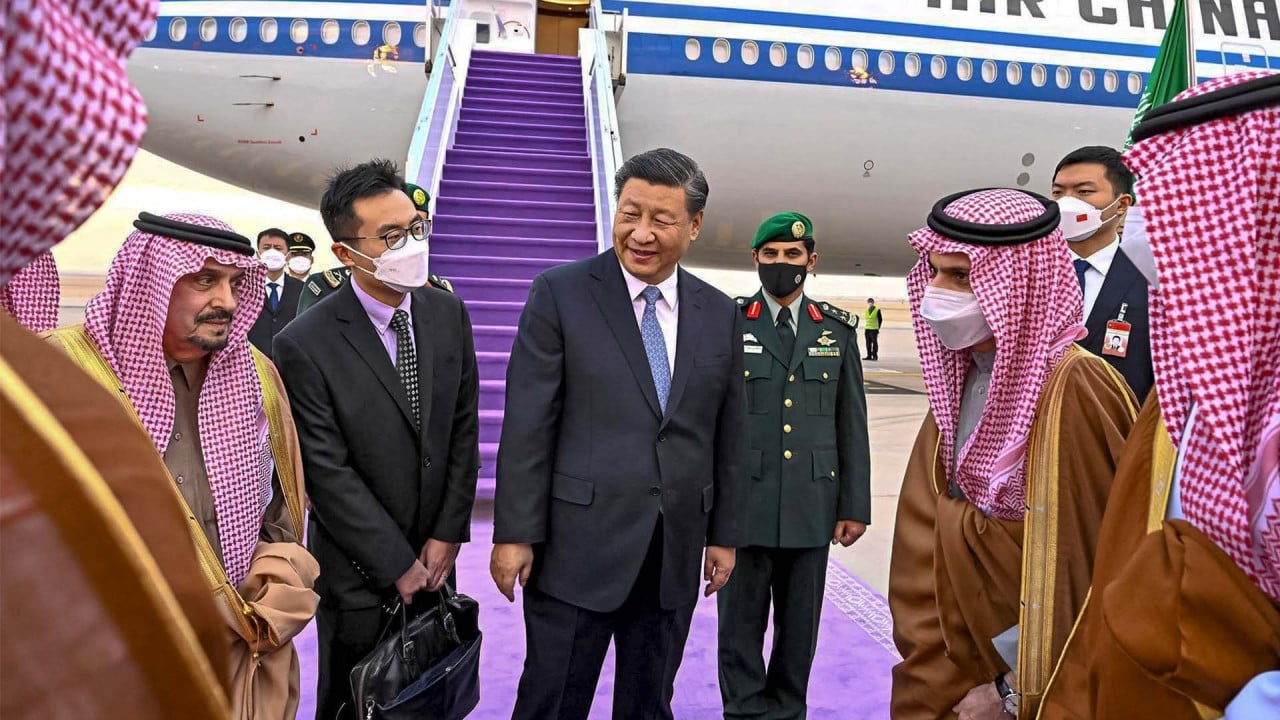Beijing hopes to see “in-depth exchange” and “fruitful outcomes” from the conference, Wang said.
James M. Dorsey, adjunct senior fellow at the S. Rajaratnam School of International Studies under Singapore’s Nanyang Technological University, said “there is no doubt” there have been booming economic opportunities for both China and the Middle East countries, but the question is to what degree China can and wants to “capitalise politically”.
“That is more complex,” Dorsey said. “China is not able to, and does not want to, get into the kind of engagement in the Middle East that the US has.
“It does not want or could not be a security guarantor. Economy is one pillar for the Saudis, security is another.”
ننتظر بحماس وفخر إلى أكبر تجمع اقتصادي عربي صيني بمشاركة ٢٣ دولة في الشهر القادم، وذلك سيقام على أرض المملكة العظمى.. حقاً الصين والمملكة دولتي أفعال وتعاوننا قائم حتى همم السحاب#مؤتمر_الأعمال_العربي_الصيني https://t.co/jdzVmbhRqQ
— Chen Weiqing (@AmbChenWeiqing) May 31, 2023
China’s growing interest in the region was marked by President Xi Jinping’s visit in December, when he attended the China-Arab Countries summit and the China-Gulf Cooperation Council summit.
Both events were hailed as first of their kind between China and the Middle East countries.
Cooperation between China and the Middle East has grown on all fronts, from trade and energy to defence, while the US’ influence in the region has generally been seen by geopolitical analysts as having declined.
China has been Saudi Arabia’s top trading partner for five years and has become the top destination of its exports and the source of imports since 2018.
Meanwhile, Saudi Arabia has been one of the biggest oil suppliers with shipments of 87.5 million metric tonnes (641 million barrels) in 2022.
Saudi Aramco, the world’s largest oil-exporting company, confirmed a major integrated refinery and petrochemical plant – expected to cost US$10 billion – in northern China’s Liaoning province in March.
Saudi Arabia does not need China’s money. Chinese companies, however, need that investment opportunity
China and Saudi Arabia, in particular, have found strengthened “solidarity” in bilateral relations, Xi said during December’s opening ceremony of the China-Arab States Summit, as both countries see growing friction with the United States.
But a Beijing-based researcher on the Middle East, who asked not to be identified as they were not authorised to speak to the media, said the anticipation ahead of the Arab-China Business Conference was “overhyped”.
“Business opportunities in the region are not going to grow exponentially just because of the growing interest of Chinese companies in the region. In the end, it creates unnecessary competition and also a waste of resources on both sides,” they said.
“Saudi Arabia does not need China’s money. Chinese companies, however, need that investment opportunity.”
The Arab-China Business Conference, jointly organised by Saudi Arabia’s Ministry of Investment, the Arab League secretary general, the China Council for the Promotion of International Trade and the Union of Arab Chambers, will hold panels on cooperation ranging from food security, global trade and supply chains to financing and China’s signature Belt and Road Initiative.
Arab League secretary general Ahmed Aboul Gheit is expected to speak at the conference, as well as a host of ministers from Saudi Arabia, including energy minister Abdulaziz bin Salman and foreign minister Faisal bin Farhan.
Tammy Tam, editor-in-chief of the Post, is set to host a plenary interview with Saudi Arabian Minister of Economy and Planning Faisal Alibrahim and Fahad Toonsi, an adviser at the Royal Court.
Essentially legitimising certain Chinese policies, [some Arab] countries would argue, is part of their national interest
Hong Kong is separately stepping up its links with the Middle East, after Chief Executive John Lee Ka-chiu led a group to the region in February, with a delegation of business executives set to visit Dubai and Abu Dhabi this week.
The delegation, led by the city government’s Executive Council member Jeffrey Lam Kin-fung, includes Tsangs Group chairman Patrick Tsang, GogoX co-founder Steven Lam Hoi-yuen, Rice Robotics founder Victor Lee and several executives of companies involved in artificial intelligence, family offices and sustainable energy.
Beijing recently arranged a four-day official tour to the Xinjiang Uygur autonomous region for a delegation of 30 officials from 16 Arab countries, including Egypt, Saudi Arabia and the general secretariat of the Arab League.
Essentially, legitimising certain Chinese policies, [some Arab] countries would argue is part of their national interest.
It came after a senior official-level strategic political dialogue at the China-Arab States Cooperation Forum, a dialogue platform between China and the Arab League set up in 2004.
Dorsey said the trip looked like “throwing China a bone” and that it has been “mutually beneficial” and “mutually reinforcing” for the predominantly Muslim Arabic-speaking countries, as the two sides have stopped short from criticising each other’s policies that claim to crackdown on terrorism.
“The US has all these conditions, engaging human rights and environment and what have you … China has conditions, they are just simply different,” Dorsey said. “This includes, ‘if you do criticise us, there are economic consequences to that’.
“Essentially, legitimising certain Chinese policies, [some Arab] countries would argue, is part of their national interest.”
Stay connected with us on social media platform for instant update click here to join our Twitter, & Facebook
We are now on Telegram. Click here to join our channel (@TechiUpdate) and stay updated with the latest Technology headlines.
For all the latest Business News Click Here

